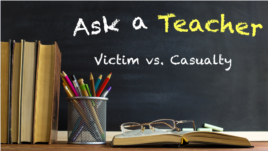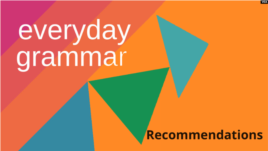01 July 2023
Let's look at two English learners. One knows about 500 words and understands how they are used in a sentence. The other knows about 1,000 words but has some problems with grammar.
Which person can understand and communicate more in English?
Clearly, it is the person who knows 1,000 words.

FILE - Merriam-Webster's Collegiate Dictionary showing the suffix -ism. (Richard Drew, AP)
Some studies have shown that for learners to fully understand a written work, they need to know 95 percent or more of the words in it. That means that if there are only five or more words you do not know in a 100-word text, you might not really understand it!
In today's program, we will give you some advice for building up your vocabulary. "Vocabulary" can mean a single word, two words such as phrasal verbs, or many words together, such as an expression.
Two important things
There are two important things to keep in mind when trying to learn new vocabulary.
First, connect new words to a story or a situation. This makes it easier to remember vocabulary than studying words from lists.
Second, be active, not passive. Make yourself use the new words.
Here are some ways to do that:
- When you find a new word or expression in a story, repeat the sentence and think of the situation connected to the new vocabulary. Write down then repeat in your head three to five more sentences that use the new vocabulary.
- Make your own short story and include several new words you want to remember. Each time you retell the story, you will review the new vocabulary in your mind.
- Make yourself explain the new word like you are a teacher. This is a great way to test how well you understand and can use the vocabulary. And if you have a study partner, you can explain the new vocabulary like you are a teacher!
More learning tips
- It is better to learn just a few words in a group of related items instead of all the words in the group. For example, if you try to learn the names of 12 different birds, you will certainly mix up which name goes with which bird. But if you simply learn the names of two or three birds, and then learn a few more at another time, you will remember more easily.
- Learn how a word can be used as different parts of speech, such as a noun, verb, adjective, or adverb. Here are examples of the word hope used in four different ways:
Noun: There is no hope of success.
Verb: I hope we win the game.
Adjective: The situation is hopeless.
Adverb: Hopefully, we will win the game.
- Be sure to learn which suffixes, or endings, are used for different parts of speech. For example, -ous, -ic, -ful, and -less, make adjectives, while -ion and -ness make nouns.
- Prepositions are among the hardest things for English learners to remember. For example, we say, "amused by" and "happy with." But we cannot say "happy by". So, you should memorize the word and its preposition together as one unit instead of two separate words.
- Music often makes it easier to remember words or phrases. Sing along with a song. But make sure that you can remember the new vocabulary without the music, too. After all, you do not want to sing every time you try to remember something!
- Learn the tone of the vocabulary. Tone means the feeling the word carries with it. Tone can be positive or negative, and formal or informal. For example, the word "idiotic" means "very stupid." It has a strong negative feeling and can be used as an insult. And "Howdy" is a very informal use of "Hello." It is hard to learn about tone by yourself. The best way to learn the tone of vocabulary is to ask native speakers about it.
- There are many apps to help you learn vocabulary. They use a way of learning called spaced repetition. For example, an app might show you a new word seven times in one day when the word is new, but then show you the word only once a week after you know it better.
- English in a Minute, News Words, and Words and Their Stories are three programs that center on vocabulary on VOA Learning English. But you can learn vocabulary from any VOA Learning English program.
Most of all, remember to be active instead of passive. Make yourself think and use new words. And you will see your vocabulary grow day by day!
I'm Andrew Smith. And I'm Dorothy Gundy.
Andrew Smith wrote this lesson for VOA Learning English.
______
Words in This Story
active -adj. characterized by taking action and doing something instead of letting things happen
passive -adj. characterized by lack of activity or letting things happen instead of taking action oneself
unit -n. a single, complete thing
positive -adj. having good and/or hopeful effects
negative – adj. having harmful or undesirable effects
formal – adj. serious and official
informal – adj. relaxed and casual, as with friends; not formal












